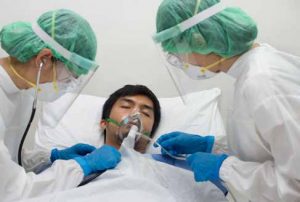 I am a rheumatologist and a public health advocate living in Seattle. I have spent over a decade focused on caring for individuals who are scared about how to proceed with their lives in times of personal uncertainty. Patients who see me are often afraid of inflammation and/or deformities in their joints that are limiting, nervous about abnormal laboratory values and downright frightened about how their futures might unfold. I have grown accustomed to dealing with areas of gray and have tried to calm my patients.
I am a rheumatologist and a public health advocate living in Seattle. I have spent over a decade focused on caring for individuals who are scared about how to proceed with their lives in times of personal uncertainty. Patients who see me are often afraid of inflammation and/or deformities in their joints that are limiting, nervous about abnormal laboratory values and downright frightened about how their futures might unfold. I have grown accustomed to dealing with areas of gray and have tried to calm my patients.
Now I am telling you to be afraid and to activate yourself. Fear is the oldest human emotion. Fear is what keeps us from leaving our children alone in playgrounds, from walking into empty and unfamiliar alleys at night, from taking medications without reading the adverse warning labels and from ignoring sharp abdominal pains until our appendix bursts. Fear is what keeps us alive and going.
Uncontrolled fear, of course, takes an immense toll on our bodies and our psyches. Fear can become paralyzing when you do not know how to proceed. My goal is not to paralyze you.
Unless you have lived in regions of the world that experienced outbreaks of Nipah virus, SARS or Ebola, you likely have never had lived through a pandemic. It is natural to be scared of a novel coronavirus that is growing at an exponential pace. It would be unnatural not to be scared. Now is the time to make sure that you #stayhome if you are not a healthcare worker or essential worker.
I have spent my adult life helping patients stay calm. I have spent countless hours discussing the need for meditation, helping patients get referred to psychiatrists and psychologists and churches, promoting the beneficial effects of weight loss and physical activity in relieving stress, and encouraging patients and friends to take vacations and to live their best lives.
I want people to continue to do what they need to stay healthy and vibrant. But, now that are we are living in the midst of a pandemic, I am asking for people to understand that the fear they feel is very real. Friends tell me that they are “on edge,” that they feel “drained,” that they feel “as if my life has suddenly stopped.” I am listening, but I also recognize that what you are feeling is normal. I am asking for you to not disconnect when at home.
As a physician and public health advocate, let me be blunt. The only thing more paralyzing than fear is guilt. If your mother or father or best friend or best friend’s child dies from COVID-19, and you did nothing, you will feel terrible, and you will wonder what you could have done to help. If you have a sense of survival and a sense of personal decency and integrity, you need to take part in local and national efforts to keep people alive. We are learning more about this virus by the day. Your family member or friend could die. My patients could die. I need to help my patients and my family. You need to take part in helping others.
There are many ways to activate yourself at this time. Here are four things that you should do. Let me be blunt again: Because we are in the midst of a pandemic, you should try to do all four, if possible.
Uncontrolled fear, of course, takes an immense toll on our bodies & our psyches. Fear can become paralyzing when you do not know how to proceed. My goal is not to paralyze you.
Reach Out …
To the healthcare workers in your lives
I have been calling friends across the country, and everyone is scared. I am so grateful for my friends who are intubating 20- and 40- and 70-year-old patients in San Diego and New York City and Bellevue; rounding on sick patients in San Jose and the East Bay and Philadelphia and Durham and Washington, D.C., educating policy makers in Boston and Seattle and Chicago; organizing food drives and homeless shelter drives and personal protective equipment (PPE) requests; and reaching out to the public to convince people to #stayhome during the COVID-19 crisis.
This pandemic is going to get a lot worse. Our physicians and healthcare workers need your help in so many ways. Please text or email or call your friends in healthcare. Messages from my patients, telling me how much they have appreciated me as their doctor have made me cry and have given me the resolve to soldier on. Your healthcare workers need your love and support to get through this disaster.
To your hospitals & ask what they need
Most elective surgeries across the nation have been cancelled. Millions of patient visits have been cancelled. Hospitals and clinics from Boston to Seattle have already furloughed or laid off staff, cutting administrator and healthcare provider salaries and closing clinic sites to plan for massive financial losses and to keep essential operations viable. Against this backdrop, hospitals are also working around the clock to keep patients and their healthcare workers alive.
Whether you realize it or not, you are not immortal. There is a not-negligible chance that, if triathletes are dying of COVID-19 in hospitals, you could also die if you get this infection. Your hospitals need to have functioning ICU beds and ventilators and PPE.
Physicians like me are continuing to see patients and do our utmost to save lives. We need you to reach out and offer to donate your time volunteering or your cash or your supplies to help keep our hospitals viable to protect you and your loved ones.
Donate Blood
Blood donation needs to be planned and does not happen all of a sudden, with two individuals hooked up to one another on a hospital floor. If you are able to donate blood, now is the time to do it.
The American Red Cross is reporting that thousands of blood donation drives across the nation have been cancelled. Further, many blood donation sites are located by colleges, which are almost all closed at this time. My orthopedic surgeon friend in Portland, Ore., needs blood when operating on patients involved in horrifying car accidents. Patients in Seattle with sepsis need blood when their hemoglobin drops to dangerously low levels. My obstetrician friend in Chicago is terrified that she will not have enough blood for women who are delivering and hemorrhaging. Your mother might need blood if she gets COVID-19 infection.
Blood donation is an essential health service, and blood donors are exempt from stay-at-home orders.
Write to Your Legislators
If your legislators are silent or not mobilizing themselves to care for you, your families and loved ones, and the healthcare system, it is also time to write to them and urge them to #helpnow and to communicate what they are doing.
There is no point to getting your high school, college and/or graduate degrees if you do not sit down now in the midst of a pandemic, in this time of national and international crisis, to write to your local, state and federal representatives.
Please write to thank legislators who are working to provide benefits to the unemployed, who are working to obtain PPE for healthcare workers and who are keeping themselves informed about public health matters.
This is not a time for legislators to relax when so many of their constituents are dying. No healthcare worker feels that a single one of their legislators should be on break. There should be virtual briefings and meetings that lawmakers are going on even if they are not meeting in person.
This is not a time for vacation or escapism. The U.S. has the largest number of COVID-19 cases on Earth, with countless undetected cases, a fragile, disconnected and fraying healthcare system, and exhausted healthcare workers. Your country needs you to be active now.
Amish J. Dave, MD, MPH, is a rheumatologist, a Humanity in Action senior fellow and a Humanity in Action Inc. board member.
Reprinted from Humanity in Action USA with permission.
Revised April 13, 2020



